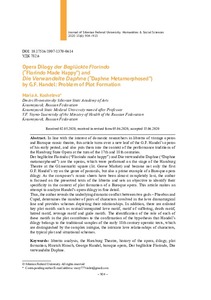Opera Dilogy der Beglückte Florindo (“Florindo Made Happy”) and Die Verwandelte Daphne (“Daphne Metamorphosed”) by G.F. Handel: Problem of Plot Formation
Скачать файл:
URI (для ссылок/цитирований):
https://elib.sfu-kras.ru/handle/2311/135367Автор:
Kosheleva, Maria A.
Кошелева, М.А.
Дата:
2020-06Журнал:
Журнал Сибирского федерального университета. Гуманитарные науки. Journal of Siberian Federal University. Humanities & Social Sciences;2020 13 (6)Аннотация:
In line with the interest of domestic researchers in libretto of vintage operas
and Baroque music theatre, this article turns over a new leaf of the G.F. Handel’s operas
of his early period, and also puts them into the context of the performance traditions of
the Hamburg State Opera at the turn of the 17th and 18th centuries.
Der beglückte Florindo (“Florindo made happy”) and Die verwandelte Daphne (“Daphne
metamorphosed”) are the operas, which were performed on the stage of the Hamburg
Theatre at the Gänsemarkt square (lit. Geese Market) and became not only the first
G.F. Handel’s try on the genre of pastorals, but also a prime example of a Baroque opera
dilogy. As the composer’s music sheets have been almost completely lost, the author
is focused on the preserved texts of the libretto and sets an objective to identify their
specificity in the context of plot formation of a Baroque opera. This article makes an
attempt to analyze Handel’s opera dilogy in fine detail.
Thus, the author reveals the underlying dramatic conflict between two gods – Phoebus and
Cupid, determines the number of pairs of characters involved in the love dramaturgical
line and provides schemes depicting their relationships. In addition, there are enlisted
key plot motifs such as mutual/unrequited love motif, motif of suffering, death motif,
hatred motif, revenge motif and guile motifs. The identification of the role of each of
these motifs in the plot contributes to the confirmation of the hypothesis that Handel’s
dilogy belongs to the traditional samples of the early 18th century operatic texts, which
are distinguished by the complex intrigue, the intricate love relationships of characters,
the typical plot and situational schemes В русле интереса отечественных исследователей к либретто
старинных опер и музыкальному театру барокко данная статья открывает одну
из новых страниц опер Г.Ф. Генделя, относящихся к раннему периоду творчества
композитора, а также вписывает сочинения в контекст традиций постановок
Гамбургского оперного театра рубежа XVII-XVIII столетий.
«Счастливый Флориндо» и «Преображенная Дафна» – оперы, ставшие не только
первым обращением Г.Ф. Генделя к жанру пасторали, но и ярким примером барочной
оперной дилогии, постановки которых осуществлялись на сцене гамбургского
театра на Gänsemarkt (площади Гусиного рынка). Так как музыка композитора
практически полностью утеряна, в центре исследовательского интереса оказались
сохранившиеся тексты либретто, определившие цель, заключающуюся в выявлении
их специфики в контексте сюжетосложения барочной оперы. В статье предпринята
попытка анализа оперной дилогии Генделя.
Так, автором выявляется основной драматический конфликт между двумя богами –
Фебом и Купидоном, определяется количество пар персонажей, участвующих в
развитии любовной драматургической линии, и приводятся схемы, отображающие
их взаимоотношения. Помимо этого, определяются такие ключевые сюжетные
мотивы, как взаимная/безответная любовь, страдание, смерть, ненависть, месть,
коварство. Выявление роли каждого из перечисленных мотивов в сюжетосложении
способствует подтверждению того, что дилогия Генделя принадлежит к
традиционным образцам оперных текстов начала XVIII века, отличающихся
сложностью интриги, запутанностью любовных отношений персонажей,
типичностью сюжетных и ситуационных схем
Коллекции:
Метаданные:
Показать полную информациюСвязанные материалы
Показаны похожие ресурсы по названию, автору или тематике.
-
Креативная рецепция библейской музыкальной драмы XIX века в рок-опере Э. Л. Уэббера «Иисус Христос – суперзвезда»
Михайлова, О. С.; Нехвядович, Л. И.; Mikhaylova, Olesya S.; Nekhvyadovich, Larisa I. (Siberian Federal University. Сибирский федеральный университет, 2023-08)В современной ситуации развития креативных индустрий, представленных широким и многообразным проблемным полем, особое значение приобретает вопрос о трансформации образов классического произведения в современном ... -
Implementation of Instrumental Theatre Principles in Yuri Kasparov’s Opera-Monodrama “Nevermore!”
Peretokina, Yuliya R.; Перетокина, Ю.Р. (Сибирский федеральный университет. Siberian Federal University., 2015-03)This article discusses the specific features of the instrumental theatre, which organically penetrates into the opera-monodrama genre, given the example of “Nevermore!” opera-monodrama by the contemporary Russian composer ... -
Особенности воплощения ветхозаветного сюжета в либретто оперы «Кир в Вавилоне» Дж. Россини
Михайлова, О. С.; Нехвядович, Л. И.; Mikhaylova, Olesya S.; Nekhvyadovich, Larisa I. (Сибирский федеральный университет. Siberian Federal University, 2022-12)Статья посвящена проблеме воплощения библейского сюжета в либретто оперы Дж. Россини «Кир в Вавилоне». Это одно из ранних и малоизвестных произведений композитора, которое вплоть до настоящего времени не вызывало ... -
Works by F.M. Dostoyevsky on Drama and Music Stage
Voitkevich, Svetlana G.; Войткевич, С.Г. (Сибирский федеральный университет. Siberian Federal University., 2014-01)This article is devoted to the works by F.M. Dostoyevsky which found original embodiment in Russian music and theatre of Russia in the last third of the XX – early XXI centuries. The research marks historical stages of ... -
Musical Interests and Priorities of Vladimir Lenin (Modern Vision)
Preisman, Emil’ M.; Прейсман, Э.М. (Сибирский федеральный университет. Siberian Federal University, 2015-06)In modern Russia the problem of cultural education, including musical and aesthetic one, has become quite acute as one of the barriers on the way of globalization negative impacts. After Perestroika, the work on cultural ...

